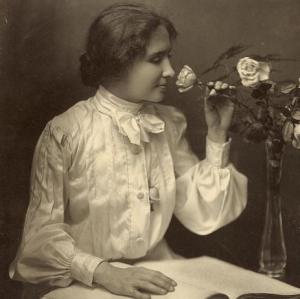
Helen Keller, courtesy of Womenshistory.org
Helen Keller’s life journey is a testament to the indomitable human spirit and the power of determination. Despite facing the challenges of deafness and blindness, she rose to become a major 20th-century humanitarian, educator, writer, and an influential advocate for various causes. Her life’s work, from her early childhood struggles to her adult accomplishments, serves as an inspiration to millions worldwide.
Born on June 27, 1880, in Tuscumbia, Alabama, Helen Keller’s early years were marred by a serious illness, possibly meningitis or scarlet fever, which left her both deaf and blind before she turned two. Her remarkable mother, Katherine Adams Keller, recognized her daughter’s intelligence and sought help from experts. It was through this determination that she was introduced to Anne Sullivan, a graduate of the Perkins School for the Blind, who became Keller’s lifelong teacher and mentor.
Through touch and perseverance, Sullivan taught Keller to communicate using the manual alphabet, spelling words into her palm. The breakthrough came quickly, and Helen began to learn rapidly, eventually attending the Perkins School in Boston, where she learned to read Braille and write with a specially made typewriter. Her progress was closely followed by the media, and by the age of 14, Keller’s story had captured the nation’s attention.
Her academic achievements were just the beginning. Even before graduating from Radcliffe College in 1904, she published two books, “The Story of My Life” (1902) and “Optimism” (1903), which marked the beginning of her prolific career as a writer and lecturer. Keller used her platform to advocate for various causes, including preventing blindness in children and championing women’s suffrage.
Keller’s political consciousness heightened with time, and she became an active supporter of the suffrage movement, embraced socialism, advocated for the blind, and became a pacifist during World War I. Her commitment to social causes extended to co-founding the American Civil Liberties Union (ACLU) in 1920, a significant organization that continues to protect and defend civil liberties in the United States.
However, Keller’s involvement in various progressive groups made her a target of scrutiny. She faced criticism for her associations with the Socialist Party and correspondence with Eugene Debs, the party’s prominent member. The FBI even monitored her due to her ties to the Communist Party. Nevertheless, Keller remained steadfast in her beliefs, fighting for workers’ rights and inequality issues during a period of rapid industrialization.
As she aged, Keller’s advocacy work did not wane; instead, she continued to lecture internationally, becoming one of the world’s most admired women. Throughout World War II, she visited military hospitals to bring comfort to wounded soldiers, demonstrating her unwavering commitment to humanitarian causes.
Keller’s dedication and achievements did not go unnoticed. In 1955, a film about her life won the Academy Award, and in 1960, “The Miracle Worker,” a play centered on Anne Sullivan, won the Pulitzer Prize. Throughout her life, she met several U.S. presidents and received numerous honors, including the Presidential Medal of Freedom and honorary doctorates from prestigious universities.
Despite her remarkable accomplishments, there remains a significant gap in the way Keller is portrayed and taught in schools. Most students learn about her early struggles and triumphs as a child, but her adult life and contributions often receive less attention. Scholars and disability rights activists emphasize the importance of recognizing Keller’s adult achievements, such as her role in co-founding the ACLU and her advocacy for civil rights, birth control, and workers’ rights.
In recent years, efforts have been made to incorporate disability history into school curricula in various states, acknowledging the contributions of people with disabilities throughout history. Helen Keller’s life and career serve as a reminder of the significance of inclusive education and the impact it can have on promoting tolerance and understanding.
Critics have raised concerns about some of Keller’s earlier writings that reflected the popularity of eugenics theories and her association with Alexander Graham Bell, a supporter of the eugenics movement. Nevertheless, Keller evolved over time and moved away from those views, focusing on her advocacy for social justice and equal rights for all.
As society continues to progress, the importance of understanding the full scope of Helen Keller’s life and accomplishments becomes evident. By teaching the true story of her struggles and triumphs, students can gain a broader perspective on disability rights, social justice, and the significant contributions made by people with disabilities throughout history.
Helen Keller’s legacy extends beyond her personal achievements; it embodies the unwavering spirit of resilience and determination in the face of adversity. Her life’s work has left an indelible mark on history and continues to inspire generations to break barriers, challenge perceptions, and advocate for a more inclusive and compassionate world. As Keller herself once eloquently stated, “The highest result of education is tolerance.”
References
Michals, E. by D. (n.d.). Biography: Helen Keller. National Women’s History Museum. https://www.womenshistory.org/education-resources/biographies/helen-keller
Perkins School for the Blind. (2022, June 14). Helen Keller. Perkins School for the Blind. https://www.perkins.org/helen-keller/
Waxman, O. B., & Aneja, V. by A. (2020, December 15). The Helen Keller you didn’t learn about in school. Time. https://time.com/5918660/helen-keller-disability-history/